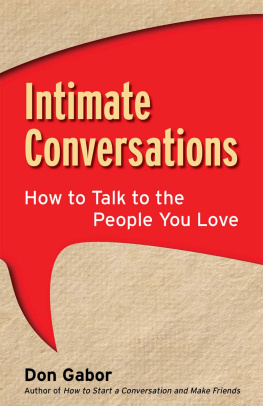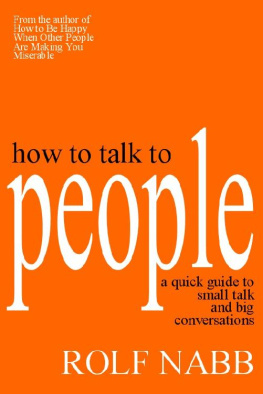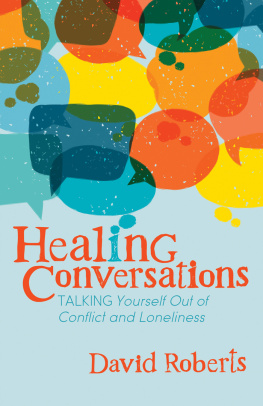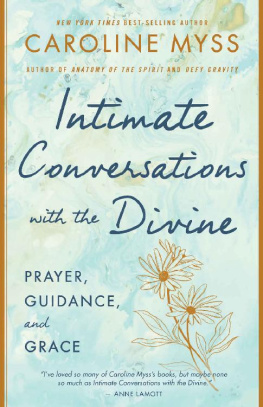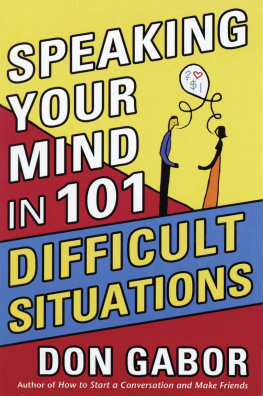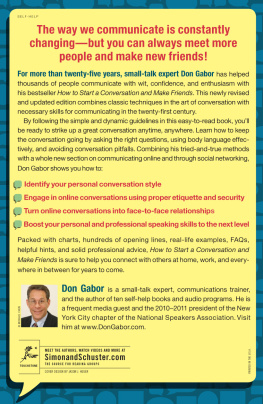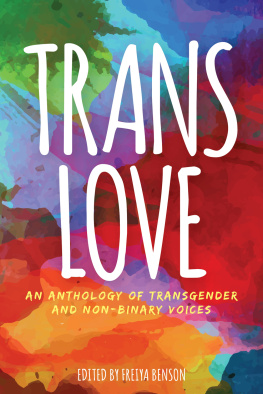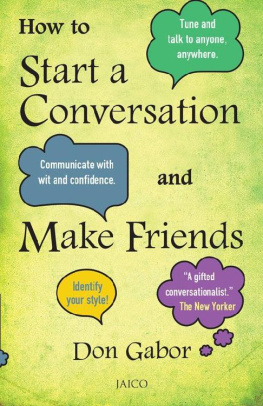Also by the Author
Books/Ebooks
How to Start a Conversation and Make Friends
Turn Small Talk into Big Deals: Using 4 Key Conversation Styles to Customize Your Networking Approach, Build Relationships, and Win More Clients
Word That Win: What to Say to Get What You Want
Speaking Your Mind in 101 Difficult Situations
Big Things Happen When You Do the Little Things Right
Talking With Confidence for the Painfully Shy
Plane-Talk: Networking at 30,000 Feet (Kindle Single)
CDs
Cmo Iniciar una Conversacin
How to Start a Conversation and Make Friends
Talking With Confidence for the Painfully Shy
Copyright 1989/2013
By Don Gabor
Conversation Arts Media
Original title: How to Talk to the People You Love
Cover design: Clear Eye Graphics
All rights reserved.
This book, or parts there of, may not be reproduced in any form without permission.
Conversation Arts Media 2013
Library of Congress Cataloging - in- Publication Data
Gabor, Don.
Intimate Conversations: How to Talk to the People You Love Don Gabor.
p. c m.
ISBN: 978-1-879834-20-0
1. Interpersonal Communication. 2. Intimacy. 3. Friendship. 4. Communication in the Family. 5. Communication in Marriage.
I. Title.
DEDICATION AND ACKNOWLEDGMENTS
This book is dedicated to my family, my friends, my wife, Eileen, and our two cats, Toby and Sophie. Our intimate conversations were part of the inspiration for this book. I also want to thank Laura Yorke, my editor at Fireside, for her sharp editorial pencil, and the following people for their cooperation and suggestions:
Ruth Bachrach
Dr. Philmore Berger
Bob Bloom
Daniel Carman
Adrian Ehrlich
Julie Haynes
Andy Levine
Steve Levine
Jeannette Lofas
Jonathan Pease Nancy
Pease Mary Power
Lucille Rhodes
Jacqueline Berger-Yudelowitz, MSW
An additional thanks goes to my assistant, Brandon Saracco, for helping me create this 2013 edition and ebook.
CONTENTS
INTRODUCTION
I have written Intimate Conversations: How to Talk to the People You Love because people often ask me how to approach personal conversations with friends and family without feeling nervous about saying the wrong thing. This book is based on the premise that people often have as much or more difficulty communicating with a friend, lover, or family member than with a stranger. Expressing personal information or speaking ones mind without inducing misunderstandings or hostility requires the ability to carry on a conversation, plus much more. Intimate conversations are motivated by a compelling desire to honestly reveal emotions and thoughts; and require a desire to go beyond politeness as well as individuals mutual trust and respect.
WHAT IS AN INTIMATE CONVERSATION?
An intimate conversation is a personal communication in which you honestly express your feelings and opinions by using your heart and your head. When you combine coolness with compassion, logic with understanding, affection with discipline, and trust with openness, you will focus on real issues while speaking assertively with common sense, insight, and love.
WHAT ARE THE BENEFITS OF INTIMATE CONVERSATION?
You can benefit from intimate conversations in at least two ways. They increase intimacy between friends and they provide greater insights into your personal relationships. When people calmly exchange their viewpoints and feelings on emotional subjects, there will be a better understanding between them, whether they are best friends, husband and wife, parent and child, or step- family members.
HOW CAN THIS BOOK HELP YOU?
Intimate Conversations: How to Talk to the People You Love is a follow-up to How to Start a Conversation and Make Friends, because even good conversationalists often experience nervousness, anxiety, and misgivings when communicating with the people they know well. This book presents alternatives to holding in what you want to say or exploding into a rage that leaves emotions raw and torn.
This book presents a solid framework of tested communication techniques in a direct and easy-to-read guide that includes specific examples, tips, and motivators to help you effectively talk with the people you love.
Part 1
INTIMATE CONVERSATIONS WITH YOUR FRIENDS
Chapter 1
BUILDING BETTER FRIENDSHIPS
One friend in a lifetime is much; two are many; three are hardly possible.
Henry Adams
There are as many definitions of friendship as there are friends, but one thing is certain most people seek someone whom they can trust and confide in. A true friend values you as a person and does not care if you wear the latest fashions, are rich, or are the chief executive officer of a large company. A friend accepts you for who and what you are without trying to change you. But making and keeping a good friend is easier said than done. The reason? Friendships are hard to make and easy to break.
Do friendships just happen? Is it chemistry that explains how two people can hit it off and become friends? Certainly individual personalities are important when two people become friends, but other factors also play a role. Since we have different needs at different stages of our lives, our friends help fill some of those requirements. For example, if you move to a new city, finding a friend helps overcome the sense of isolation and loneliness that comes from not knowing anyone. Making friends at work helps you feel like part of a team and provides an opportunity to be recognized and appreciated for a job well done.
People also become friends to share their opinions and feelings. Often we do not really know what we think and feel until we hear ourselves speak and see the reaction of the people whose opinions we value. In this way our friends help us confirm, reshape, and expand our views. They provide us with a yardstick for measuring whether our perceptions are realistic or way out in left field.
Another factor that propels us toward friendships is the fear of being alone and living in an emotional vacuum. Studies show that our biggest fear is not nuclear war, starvation, or illness. Rather, it is being alone without companionship or love. Since most of us thrive and grow on personal contact, true friendships develop from a mutual commitment with a firm foundation of trust, respect, exchange, and emotional support.
------------- THE FRIENDSHIP TREE -------------
T=TRUST:Friendships, like marriages, are dependent on avoiding the unforgivable. John D. MacDonald
R=RESPECT:Love your friend with his faults. Proverb
E=EXCHANGE:Friendship is an arrangement by which we undertake to exchange small favors for big ones. Baron de Montesquieu
E=EMOTIONAL SUPPORT:A true friend will see you through when others see that you are through. Robert Louis Stevenson
TRUST = CONFIDING + UNDERSTANDING
I know that I can tell my friend just about anything and trust that she will understand and keep my secrets to herself.
When friends reveal private feelings, trust in each other grows naturally. As a result, their intimate conversations provide opportunities to monitor the emotional depth of the friendship. As the conversations become more personal, revealing, or sensitive, the trust and the relationship will continue to expand. On the other hand, if there are few personal revelations, or if one person seems to hold back, then chances are the trust in the friendship may be reaching a leveling-off point.
Next page
